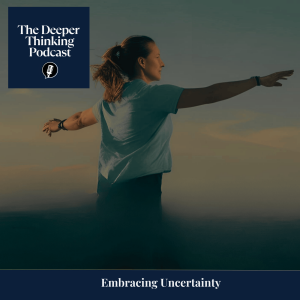
Saturday Mar 08, 2025
Embracing Uncertainty: Why Control is an 𝖨𝗅𝗅𝗎𝗌𝗂𝗈𝗇- 𝖳𝗁𝖾 𝖣𝖾𝖾𝗉𝖾𝗋 𝖳𝗁𝗂𝗇𝗄𝗂𝗇𝗀 𝖯𝗈𝖽𝖼𝖺𝗌𝗍
Embracing Uncertainty: Why Control Is an Illusion
For centuries, humans have sought control—over nature, societies, economies, and even our own minds. We build institutions to enforce order, create systems to predict the future, and develop technologies to reduce risk. But what if control itself is the illusion? What if the very pursuit of certainty makes us more fragile?
In this episode, we explore how top‑down governance, financial systems, artificial intelligence, and self‑optimization culture all share a common flaw—the belief that we can eliminate uncertainty. But as history has shown, efforts to control chaos often amplify it.
Governments collapse under the weight of overplanned economies. Markets crash when stability breeds reckless risk‑taking. AI systems designed to predict behavior create feedback loops of unexpected outcomes. Even the self‑help movement, with its relentless push for optimization, leads not to fulfillment, but to anxiety and burnout.
Drawing from James C. Scott, Hyman Minsky, Bernard Stiegler, and Viktor Frankl, we uncover the paradoxes of control:
- James C. Scott shows how grand social engineering projects fail by ignoring local knowledge and complexity.
- Hyman Minsky explains why economic stability paradoxically breeds collapse.
- Bernard Stiegler argues that our obsession with technological control erodes human agency.
- Viktor Frankl teaches us that meaning is found not in control, but in how we respond to uncertainty.
Support the Podcast: If these conversations matter to you, please buy me a coffee to help keep them going at buymeacoffee.com/thedeeperthinkingpodcast
Why Listen?
- Understand why efforts to eliminate uncertainty often intensify fragility
- Explore the governance failures revealed by Scott’s critique of state planning
- Delve into Minsky’s financial instability hypothesis and its modern echoes
- Consider Stiegler’s warnings about technology’s impact on human freedom
- Learn from Frankl how embracing uncertainty can lead to deeper meaning
Listen On:
Further Reading (As an Amazon Associate, I earn from qualifying purchases.)
- Seeing Like a State by James C. Scott – How certain schemes to improve the human condition have failed.
- Stabilizing an Unstable Economy by Hyman Minsky – The origins of financial fragility and paradoxes of stability.
- Technics and Time, 1: The Fault of Epimetheus by Bernard Stiegler – How technology shapes human agency and temporality.
- Man’s Search for Meaning by Viktor Frankl – Finding purpose in suffering and uncertainty.
#Uncertainty #Control #JamesCScott #HymanMinsky #BernardStiegler #ViktorFrankl #TheDeeperThinkingPodcast
Comments (0)
To leave or reply to comments, please download free Podbean or
No Comments
To leave or reply to comments,
please download free Podbean App.